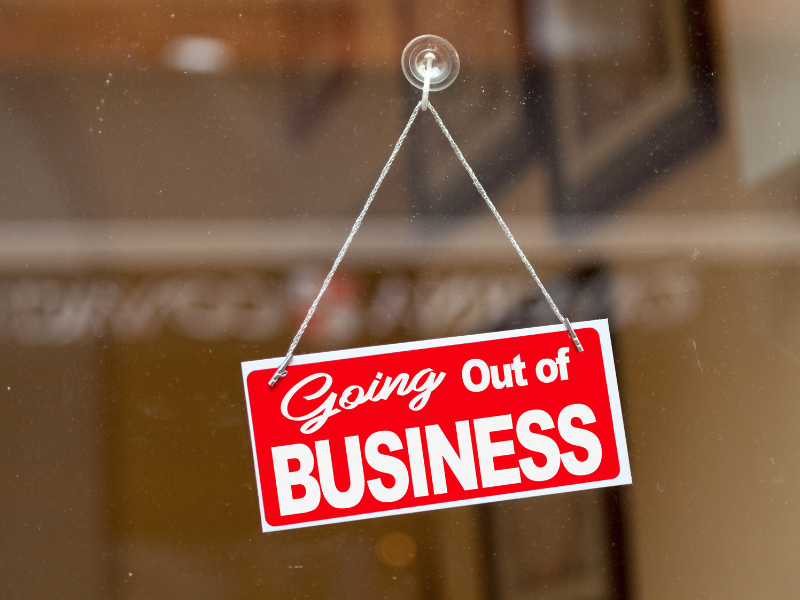Starting a business takes courage, vision, and a lot of grit. But sometimes, stepping back or even winding down is the most strategic move an entrepreneur can make. Deciding to close a business is challenging, but knowing when it’s time to do so can save resources, preserve personal well-being, and set the stage for future endeavors.
If you’re considering your business’s future, here are six signs that it may be time to consider a business wind-down and how taking a strategic approach to closing up shop can help preserve what you’ve built.
1. Financial Losses Keep Piling Up
When to Know: Your revenue isn’t covering expenses, and cash flow is consistently negative.
Most businesses experience ups and downs, but if cash flow issues have become the norm rather than the exception—it may be time to assess. When debt grows faster than revenue and operational costs outweigh income month after month, your company may be operating in the red. This is particularly pressing if debt obligations are growing and there’s no realistic path to meeting them. An organized wind-down can protect your personal finances, honor obligations to creditors, and give you a chance to bounce back sooner.
2. Market Conditions Have Shifted Dramatically
When to Know: There’s been a major change in your industry, market, or technology that’s beyond your control.
Business landscapes change quickly, and sometimes, market shifts make it almost impossible for companies to adapt. Whether it’s new regulations, shifts in consumer behavior, or the entrance of bigger, more competitive players, changing conditions can push even the best businesses into a corner. If your business model is built on conditions that no longer exist, winding down may be the responsible choice.
3. Exhaustion and Burnout are Taking a Toll
When to Know: Your personal health, relationships, or well-being are consistently impacted by the stress of the business.
Entrepreneurs are no strangers to hard work, but when the stress starts to spill over into health issues, strained relationships, and a constant sense of fatigue, it’s worth reevaluating. If you’re consistently running on empty with little hope of relief, it’s a sign that the demands of the business may be too much to sustain. Winding down a company can be an opportunity to realign, refocus, and consider what’s next with a clearer perspective.
4. Lack of Market Demand
When to Know: Sales have plateaued or dropped consistently with no signs of improvement.
Sometimes, a business idea has a limited lifespan. If you’re seeing a consistent drop in sales and have exhausted efforts to pivot, it may be time to close shop. Poor market demand often points to a product-market fit issue or a fundamental change in what customers are willing to pay for. In this case, a well-organized business wind-down can allow you to exit with dignity and avoid the financial strain of trying to force demand that isn’t there.
5. Securing Funding Becomes Nearly Impossible
When to Know: Investors and lenders are consistently unwilling to provide funding.
Businesses need capital to grow, especially in the startup phase, but if you find it increasingly difficult to secure funding, it may be an indication that investors no longer believe in the potential for returns. Without fresh capital, it’s challenging to sustain operations, meet payroll, or fund growth initiatives. Rather than draining personal resources to keep the business afloat, winding down may be the smarter option.
6. The Vision No Longer Aligns with Your Goals
When to Know: You’ve outgrown the business, or it no longer aligns with your values and long-term goals.
Entrepreneurs evolve, and sometimes, the business you started may not fit the direction you want to go in anymore. If your personal goals and values have shifted, or if you no longer find satisfaction in what you’re building, a wind-down could be an opportunity to redirect your focus. Winding down a business in this context isn’t about failure; it’s about making space for something that aligns more with who you are and where you want to go.
What Does a Strategic Wind-Down Look Like?
Winding down a business can be complex, but with the right approach, it’s possible to close responsibly and minimize potential fallout. Here are some core steps to consider:
- Inform Stakeholders Early: Let employees, partners, and investors know about your decision with as much advance notice as possible to help them plan.
- Assess Financials: Review outstanding debts, tax obligations, and contractual agreements. Liquidate assets if needed to meet obligations and prepare accurate financial statements.
- Close Contracts Carefully: Ensure all customer, supplier, and lease agreements are properly terminated. This includes fulfilling any final obligations and handling refunds or outstanding work commitments.
- File Necessary Legal Documentation: Work with a legal or accounting professional to ensure you file the proper paperwork, such as dissolution forms and final tax returns.
- Consult Professionals: Partnering with a wind-down expert can provide specialized guidance in managing the financial, operational, and legal aspects, ensuring a seamless and efficient business wind-down.
In Summary
Deciding to wind down a business is one of the hardest choices an entrepreneur can face, but sometimes, it’s the most strategic. Recognizing the signs early and taking an organized approach can allow you to exit gracefully, protect your resources, and set yourself up for future success.
If you’re considering a business wind-down, Ravix Group’s experienced team is here to support you with our specialized liquidation and wind-down services—helping you close with clarity and confidence. Reach out today to learn how we can assist in your journey.

